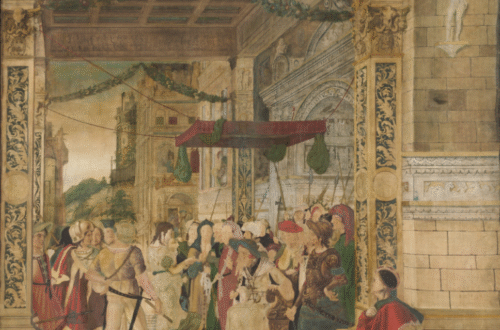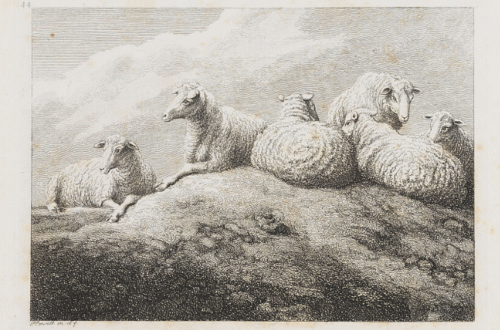One of the major characters in the Bible that many would call a patriarch is Abram, better known as Abraham. Like many Bible characters who lived before the time of King David (before 1040 BC), it is hard to know much about these patriarchs. We not only lack what is referred to as reliable historical information but there also isn’t any archaeological evidence that proves the existence of Abraham. Along with Moses, we believe that Abraham lived because the Bible tells us so, in Genesis 12 (NKJV):
1 Now the LORD had said unto Abram, Get thee out of thy country, and from thy kindred, and from thy father’s house, unto a land that I will shew thee: 2 And I will make of thee a great nation, and I will bless thee, and make thy name great; and though shalt be a blessing: 3 And I will bless them that bless thee, and curse him that curseth thee: and in thee shall all families of the earth be blessed.
Genesis 12 begins a new division in the book of Genesis. The first eleven chapters are called “primeval history.” These chapters convey the story of the first years of the world’s existence and are usually divided into three main parts: the creation and fall of humankind (chapters 1-6); the Flood (chapters 6-9); and the Flood to Abraham (chapters 9-11). The last chapters of Genesis are known as “patriarchal history.” Pastor Bob Deffinbaugh writes:
While the effect of man’s sin has become increasingly widespread, the fulfillment of the promise of God in Genesis 3:15 has become more selective. The Redeemer was to come from the seed of the woman (Genesis 3:15), the from the descendants of Seth, then Noah, and now Abraham (Genesis 12:2-3).
Theologically, Genesis chapter 12 is one of the key Old Testament passages, for it contains what has been called the Abrahamic Covenant. This covenant is the thread which ties the rest of the Old Testament together. It is critical to a correct understanding of Bible prophecy.
Rabbi Joseph Telushkin also has an interesting observation about Abraham and writes:
The Torah nowhere explains why God chooses Abraham for this mission, though Jewish tradition claims it is because he is the first monotheist since the time of Noah. A Jewish legend teaches that Abraham’s father, Terakh, owned an idol shop. One day, while his father was away and Abraham was in charge of the store, he smashed all the idols but the biggest with an ax, and then put the ax in the remaining idol’s hand. To his outraged father’s question as to what had happened, Abraham explained that the large idol became upset at the other idols and destroyed them.
“You know these idols can’t move,” Terakh shouted.
“If they can’t save themselves,” Abraham answered, “then we are superior to them. So why should we worship them?”
Because this rabbinic tale is taught to almost all children in Jewish schools, many Jews mistakenly believe that it is in the Torah itself.
As we continue reviewing the text, Yahweh speaks to Abram, and his words are:
1 The LORD had said to Abram, “Go from your country, your people and your father’s household to the land I will show you. (NIV)
What does it mean for Abram to leave his country? In some ways, we can imagine what it would be like telling a young man or woman, “Now is the time for you to go and pursue a college education.” Depending on what field of study one chooses, and how badly one wants to leave their parents, some students might pick a college several states away.
But Abram is not a young man going off to college. He is 75 years old. This is a different culture compared to what we know. 75-year-old people are usually not thinking about leaving home, unless, of course, it is a nursing home. Many 75-year-olds we know are enjoying a peaceful lifestyle living in their retirement communities, not thinking of taking off and leaving their family behind. Yet, here we have Abram faced with this task, as Yahweh continues:
2 I shall make a great nation, I shall bless you and make your name famous; you are to be a blessing! 3 I shall bless those who bless you, and shall curse those who curse you, and all clans on earth will bless themselves by you. (NIV)

Abram surely knew that what was promised to him was not going to be something that he would live to see in its entirety or even his lifetime. But it did not matter because the promise was enough for Abram to step out and obey. Abram was willing to take that risk.
How are we doing when it comes to taking risks? Our culture teaches us that once we’ve reached 75 it’s time to settle down, not get up and start out on a whole new journey. But the Christian faith is a new journey. Nowhere in the Bible does it mention “retired Christians.” Yet some have that attitude.
Some may try to justify being a retired Christian. They might stop being involved in church activities or not participate in the gospel message. But the Bible doesn’t give a pass. Christians continue to live by faith and take risks as they are led by God.
Abram took a risk by leaving his homeland to journey off into unfamiliar territory. Jesus Christ also took many risks, as he continued to preach the message and help the sick while going to Jerusalem where he’d be crucified. Let’s consider modeling our lives after Abram (and Jesus) who are risk takers. Let each of us ask ourselves; what risks does God have for me to take today?
Title: Taking a Risk | Sermon: February 28, 1999 First Christian Church, LaJunta, Colorado
Sources:
- Bob Deffinbaugh. May 12, 2004. “12. The Call of Abram (Genesis 11:31-12:9).” Bible.org.
- Rabbi Joseph Telushkin, Jewish Literacy (New York: William Morrow and Company, Inc., 1991, 30.



